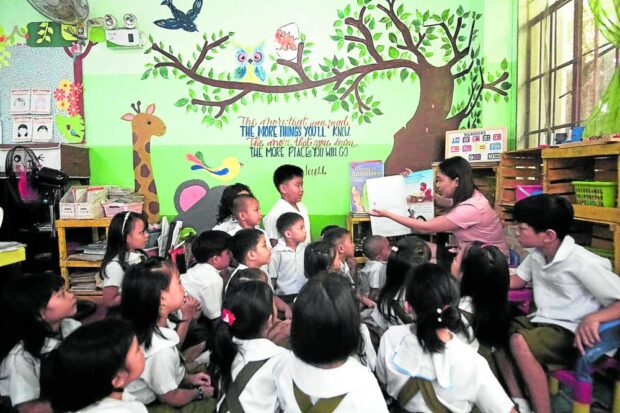Tip to teachers: Group pupils according to their reading skills

PAGE-TURNER Storytime at Ibalon Central School in Legazpi City, Albay province, where pupils gather at their “Reading Corner” in this photo taken on March 2, 2020. —Mark Alvic Esplana
As the Department of Education (DepEd) eyes to dedicate Fridays to a reading program intended to improve the literacy skills of students, an education expert underscored the need to have a baseline assessment of the learners’ capacities and group them accordingly to ensure the effective implementation of the learning recovery initiative.
In an interview with the Inquirer on Thursday, Dr. Karol Mark Yee, executive director of the Second Congressional Commission on Education (Edcom 2), said the learners must be arranged based on their capacity to read, whether they are slow readers, nonreaders, or literate.
READ: DepEd to introduce reading program to boost literacy
Edcom 2 is the congressional body mandated to conduct a comprehensive assessment of the Philippine education sector. It convened in January this year and is expected to complete its task in 2025.
Currently teaching at Ateneo de Manila University, Yee has a master’s degree in international education from Harvard University and a doctorate degree from the University of Cambridge. He is also a research fellow at the University of the Philippines Center for Integrative and Development Studies.
He is also a former executive director at the Commission on Higher Education.
If the students with different levels of reading ability were only to be combined in one classroom, Yee pointed out that teachers would not be able to “[meet] them where they are.”
“The literature around the world tells us that you can do learning recovery [efforts] well if we teach at the right level … We need to have an assessment and a grouping that allows us to know who is good [in reading], who is not, who needs a lot of help,” he said, adding that the kids needed to be supported differently.
Innovative approach
Vice President and Education Secretary Sara Duterte announced earlier this week that starting Jan. 12 next year, DepEd would begin implementing “Catch-up Fridays,” where all learners from Kinder to Grade 12 would use the time to read books, articles and other reading materials based on their interest.
The education chief did not disclose definite numbers but said that DepEd had its data on the literacy rate of students as well as figures from international assessments to serve as their basis in formulating policies such as Catch-up Fridays.
READ: Teaching reading before K-12: enjoyable and productive
Asked for specifics, DepEd said it was still consolidating data on the total number of nonreaders and slow readers in the country.
If the students are already literate, Duterte said they would be taught critical thinking and analysis skills, while those who already know critical thinking and analysis will be instructed to “write a book [or] write an essay,” among others.
The detailed guidelines for the reading program would be released next month, Duterte said.
Catch-up Fridays, part of DepEd’s learning recovery efforts, stemmed from Duterte’s directive to innovate the agency’s approach to addressing learning losses.
Not a total failure
According to a World Bank report in 2022, nine out of 10 Filipino children, or 91 percent, struggled to read simple texts by age 10, or the late primary age.
In the 2018 Program for International Student Assessment (Pisa) conducted by the Organization for Economic Cooperation and Development (OECD), Filipino students aged 15 scored the lowest in reading comprehension, with an average score of 340 points, way below the survey average of 487 points.
With the Pisa 2022 results coming next month, Duterte reiterated that DepEd was not expecting good results, saying, “we’ve already had two Pisa results but our efforts did not show good scores in the assessment of the kids.”
For Edcom 2’s part, Yee said they were likewise not anticipating dramatic changes in the results of the latest international assessment as “there are still many challenges that we need to resolve.”
The commission is currently analyzing the data from the Pisa 2018 and next year, Edcom 2 will visit specific Philippine schools that performed better than the OECD average.
“We want to understand what did they do differently given the same constraints in the Philippines to actually succeed so well in Pisa,” Yee said.
“Because now, with the narrative of learning crisis and learning poverty, it doesn’t mean that we are all a failure. Actually, there are many successes, we just don’t see and so we want to understand that because we want to look at the positive deviance,” he added.
Given the available data from the Pisa 2018, Yee said Edcom 2 was also benchmarking with other countries, particularly how other lower-middle-income countries invested in the most critical aspects of their education system.